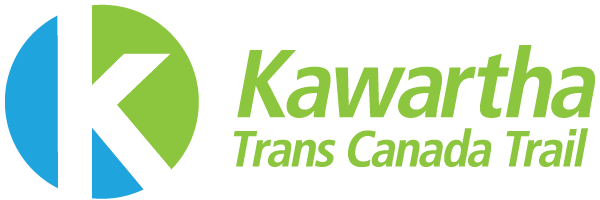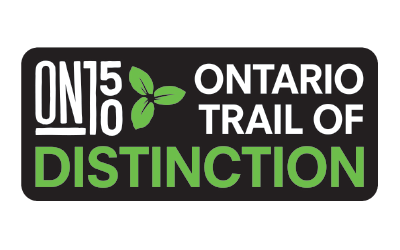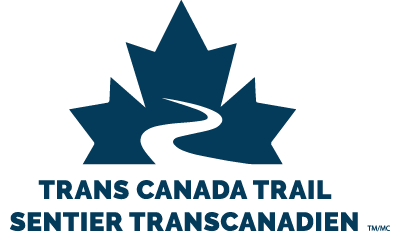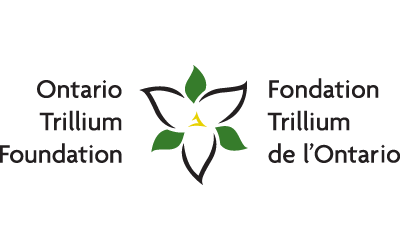Policies
Kawartha Trans Canada Trail Association, as a not for profit charitable organization, gratefully accepts business sponsorships to support its mission relevant activities. KTCTA will not solicit or accept sponsorships/donations from business/corporate entities whose practices, policies, or operations are deemed unacceptable and contrary to the values of the Association.
Mission:
- To improve the urban and rural environment by developing and maintaining a recreational trail or greenway linking communities.
- To organize and participate in environmental projects designed to preserve and protect flora and fauna.
- To educate and increase public awareness, appreciation, and understanding of the environment by offering courses, seminars, conferences and meetings and by collecting and disseminating information.
- To promote active and healthy lifestyles by offering courses, seminars, conferences and meetings, and by collecting and disseminating information on the Trail's five core uses--hiking, walking, cycling, horseback riding and snowmobiling.
Statement of Policy
KTCTA actively solicits and encourages individuals, the business community, service clubs, and other organizations to donate to the KTCT. This policy is designed to be mindful of KTCT’s status as a nonprofit charitable organization under the law. KTCTA reserves the right to refuse or decline any offer of donation at its absolute discretion or to negotiate with the donor concerning any aspect of a proposed donation.
Business donors, upon request, and in exchange for the beneficial donation of cash, or quantifiable products, and/or services-in-kind in excess of $100.00 will be acknowledged with a letter of appreciation, and a charitable donation tax receipt if the gift is eligible under CRA rules. Additionally, and subject to prior approval of the KTCTA and Fleming College, business donors will be eligible for recognition of any donation greater than $1000.00 by having its business name identified on the Fred Denure Donation Wall, located at Fleming College Lindsay.
Policy Guidelines
KTCTA welcomes corporate/business donations in support of its organizational efforts subject to the following guidelines:
- KTCTA will not accept a corporate donation that reflects in a negative manner on the organization, does not align with its mission statement, or is not in the best interest of the organization as determined by Board of Directors.
- For guidance, KTCTA will not accept corporate donations for certain categories of products and services, including alcohol products, illegal drugs and drug paraphernalia, weapons, tobacco products or establishments, sexual escort services, gambling opportunities or casinos, weight-loss products or plans, and check cashing services.
- For guidance, the acceptance of a corporate donation will in no way represent KTCTA endorsement, directly or by implication, of the donor organization, its products, services, or ideals.
- For guidance, the KTCTA will at all times retain control over its operations and projects, and donor input will be limited to any term negotiated at the time of donation.
- This policy is not applicable to philanthropic contributions, grants, or unsolicited donations for which no benefits accrue to the KTCTA.
The Kawartha Trans Canada Trail Association wishes to acknowledge the importance of gifts and donations to the ongoing development and preservation of this exceptional trail system. Individuals, Foundations, Corporations and Community Groups are all invited to participate. This policy will:
- Provide appropriate, timely and donor-centered recognition of all charitable donations;
- Guide the public recognition and acknowledgment of major donors;
- Provide public evidence of philanthropic activity demonstrating that the Kawartha Trans Canada Trail enjoys considerable external support; encouraging others to invest in the trail.
Purpose
The purpose of this Policy is to clarify process related to the receipt of gifts and sponsorship to the KTCTA and ensure compliance with Canada Revenue Agency (CRA) policy and rules as related to charitable giving. The Fred DeNure Donor Wall will be used to recognize donations that assist in the construction of additional trail and ensure the trail’s sustainability, as defined by this policy.
Recognition
Donations are recognized based on level of contribution. Income tax receipts are issued for donations of $20 or more. For donations above $100 the donor's name is placed on the Fred DeNure Donor Wall on the trail at Fleming College. Numerous other forms of honouring donors are possible as they directly relate to special projects or specific fundraising initiatives. Contributions are encouraged.
General financial contributions are needed to meet ongoing operational costs. However, contributions can be made for specific use, including easy-rest benches, bike parks, and information shelters. In-kind donations of products or services are welcome.
Fred Denure Donor Wall
The Fred Denure Donor wall is located on an outside wall of the Natural Resources Law Building adjacent to the Kawartha Trans Canada Trail at Fleming College, Frost Campus, Lindsay Ontario.
The KTCTA will recognize donations of $100 or more on a donor wall by inscribing the name on a special plaque according to the name stated on the donor form. For this wall, donations are cumulative and donors will be able to move to the higher donor level. The following categories will be used:
- Trail Champion - $1,000 and more
- Trail Master - $500 - $999
- Trail Blazer - $100 - $499
- Trail Maker - $50 - $99
- Trail Supporter - $49 and less
Donor Wall Names: Upon sufficient names being accumulated each Spring and Fall the Fred Denure Donor Wall will be updated with new names.
Notification Name on Wall: The Kawartha Trans Canada Trail website will provide notice of “new” names that have been added to the wall.
Application for Name on Wall: The donor form must be completed by the donor to indicate that they want the name listed on the wall. If there is no completed form, the funds received will be treated as a donation only and will not be listed on the wall.
Definitions of Terms
The KTCTA is committed to the highest ethical standards of philanthropy and development and reserves the right to decline any gift that is deemed not to be in the best interest of the KTCT or that is beyond our resources to manage. Gifts are accepted on the condition that if a use is stipulated by the donor, it is consistent with the mission, policies and objectives of the KTCTA.
Gifts of Money: monetary gifts are not restricted leaving the decision to the KTCTA to fund areas of need.
Donor Records: The KTCTA shall maintain all donor records, the contents of which shall remain confidential unless the donor agrees otherwise.
Releases: Media releases will be made in honour of those who donate $10,000 or more upon receipt of their donation.
Media Event: Special media announcements will be arranged in honour of those who donate $25,000 or more within a year of their donation.
Official Tax Receipts: Tax receipts are issued for all donations of $20 and more. For donation amounts less than $20, receipts are issued upon request only. For in kind donations, official receipts will be issued provided that the value of the donation exceeds $20 and a third party, commissioned by the KTCTA, has provided written appraisal of the donations worth.
Sponsorship: is traditionally defined as financial support of an event or activity. As such, the donator is not eligible for a charitable tax receipt. As well, if funds are provided for an event or activity whereby promotion, marketing, recognition or other direct benefits are received due to this sponsorship, their name will not be listed on the Fred Denure Donor Wall.
Letters of Appreciation: Letters of appreciation and receipts are issued automatically when donations are received. A separate letter will be sent on account of “in memory of” or “in honour of” donations to the person stated in the donor form.
Annual Newsletter: Annual newsletter will be used to raise awareness, report progress, and recognize donations. Donors of over $50 will be recognized in the newsletter during the year of their donation.
Listing on Website: All donations of $50 or more that have the name stated on the donor wall will be listed on the KTCTA website within a year of the donation with the specific year of the donation noted.
Approved June, 2008
Purpose: This policy provides clarity on the relationship between the Kawartha Trans Canada Trail Association (KTCTA) and adjacent land owners, permitted trail uses, and provides guidelines on monitoring and enforcement mechanisms.
KTCTA is a not for profit organization; its organizational structure provides for multiple stakeholder representation including but not limited to adjacent landowners, user groups, institutional and municipal representatives.
Regular communication with the Public will be maintained through use of KTCTA Website.
Insurance coverage will be maintained by the KTCTA as it relates to the responsibilities of the Organization and obligations for the trail.
The KTCTA will make every attempt to accommodate, individuals and groups with special needs that may not be traditional users of a trail, including the elderly, persons with disabilities, school educational programs and other persons with special needs.
Signs will be posted, and appropriate gateways/barriers installed at entrances to the trail and road crossings, that clearly indicate the uses permitted, rules for the use, and contact information for the KTCTA.
The KTCTA will conduct regular patrols to inspect the line for damage, environmental problems and other physical characteristics that require maintenance or repair.
The KTCTA, will work in consultation with the police department having jurisdiction in the area to devise a patrol and enforcement strategy.
When preparing management or operational plans the KTCTA will contact all affected adjacent landowners to consider details development proposal and the trail use.
Where a landowner owns, or a farmer requires access to lands on both sides of the line, that owner shall be entitled to a crossing of the line. The Landowner is expected to consult with the KTCTA regarding the location, and design of any such crossing.
Permitted Trail uses include: hiking/walking, cycling, horseback riding, cross-country skiing and snowmobiling.
Other than those exemptions listed in items 12-13 (below) no motorized vehicle shall use the trail, except as authorized for trail maintenance, patrol, and emergency purposes.
Right angle crossing of the trail by adjacent landowner and farmers for access to their lands, moving of equipment, and maintenance is permitted.
Snowmobiling may be permitted, subject to the detailed conditions listed below.
Winter snowmobiling activities will share the line with non-motorized uses.
Improvements for snowmobiling will be compatible with other non-motorized uses.
West section of rail corridor – existing use by Heart of Ontario Snowmobiling club be continued.
ATV’s and motorcycles are not permitted.
Approved March 26, 2009
A Special Event shall be defined as: any specific activity on the KTCTA which is promoted by a third party organization; with or without an attached fee. (e.g. walkathon, bike-a-thon, etc) Additionally, a special event will also be interpreted as any (organized) activity or outing which would be intended for more than 25 participants on one date. (e.g. nature hike)
- Purpose
- To provide opportunities for recreation, group activity, and fund raising where compatible with the objectives for use of the Kawartha Trans Canada Trail and;
- To reduce potential for conflict among Trail users, other special events and trail maintenance activities and;
- To ensure the continued enjoyment of the KTCT by all permitted users.
- Criteria for analysis of recreational activities
- Activities will be monitored for compliance and impact on the trail corridor. Continued use will be evaluated on these results.
- Activity should not require significant KTCTA resources for administration and monitoring.
- Activity must not pose significant liability concerns to the KTCTA.
- Activity must be in line with mandate of the KTCTA and not be contrary to other Provincial legislation including (but not limited to) the Greenbelt Plan, Species at Risk Act, Highway Traffic Act, Off Road Vehicles Act, Trespass to Property Act, Occupier’s Liability Act)
- Requirements for Event Applicants
- Special Event application must be submitted a minimum of 60 days prior to the planned event. Proof of insurance at time of request
- Map indicating section(s) of the trail you wish to use
- Temporary signs (if used), may be placed 7 days prior to the event and removed 3 days after.
- The event organizer is responsible for obtaining any required road permits, and police notification.
- Special event permission is limited to use of the KTCT only.
- All special events must comply with all other rules of use affecting the KTCT.
Kawartha Trans Canada Trail Association operating policies policy number: No. 1 dated: March 18, 2010
Intent: A guide for managing partners and volunteers to deal with vandalism.
Definition: Vandalism refers to wilful damage to property.
Strategy: Where vandalism may be a one time occurrence and damage is minimal, try to remedy immediately and note the occurrence for reference. If occurrences continue to take place repeatedly and the nuisance has escalated to become persistent and/or expensive further action may be required. Discuss with the trail coordinator before calling the authorities. The partner will contact the KTCT coordinator for further instructions. If the vandalism is taking place or someone (trail user or partners) is at risk of personal injury or further property damage may occur, immediately the authorities will be called by the trail partner(s). A follow up communication to the trail coordinator is requested. A meeting with the trail managing partners, volunteers and committee members will be held each spring to train and inform those involved in the trail program of the procedures and guidelines to be used in the management of vandals on the KTCTA. A contact list of names, phone numbers will be provided by the committee chairperson at the spring training session.
KTCTA partners, volunteers and or workers are not expected to confront vandals on or off the trail. Representatives of the KTCTA are expected to take the following action when they observe vandals or vandalism:
- Do not confront any adult or group of people committing an incident!
- Take notes of the incident (what happened, where and when).
- If observed:
- Try to obtain a description of the person involved;
- if a vehicle is involved get the best description you can, (registration number, make, colour).
- Keep a record of the frequency of incidents.
- Complete a report and forward to the trail coordinator.
- If a sign is removed have it replaced as soon as possible.
- If vandals have created a high risk occurrence where liability of injury is likely to occur the appropriate police authority (OPP or Municipal Police depending on the location) should be called.
- If the incident involves minor damage i.E. A sign – stolen, tagged, a lock removed – have the item replaced as soon as possible – prepare a notation of the date, time and extent of damage and report to the trail coordinator.
Police Authorized to Enforce Laws on Kawartha Trans Canada Trail
The City of Kawartha Lakes (Lindsay and Ops) Police Service and the City of Kawartha Lakes - OPP Detachment have been provided a letter of authorization from the Board of Directors of the Kawartha Trans Canada Trail Association to access the Trans Canada Trail in order to Act as its agent for the purpose of provincial enforcement in the event of inappropriate use such as ATV and Dirt Bike and enforcing the Trespass to Property Act and other related legislation.
Guidelines
Volunteers will be viewed, by the public, as agents of the KTCTA. As such, their conduct and interaction with the public should at all times reflect the dignity of that position.
All volunteers MUST complete a KTCTA application. Volunteers who have completed and signed this application are covered by KTCTA’s liability and volunteer insurance policy while carrying out their duties.
Responsibilities
Volunteers are expected to assist the KTCTA for a minimum of 8 hours per year in order to remain within the program. Responsibilities will include, but are not limited to assisting with:
- Trail Operations
- Fundraising
- Communications & Promotions
Orientation Session
Volunteers will receive training in their duties from the Volunteer Coordinator- remove just say training will be provided. Training will include, but not be limited to the following areas:
- Specific duties related to area(s) of responsibilities
- Public relations
- Safety
- Risk Assessment
Termination
The Volunteer may terminate his/her service to the KTCTA at any time in writing. The KTCTA may terminate a Volunteer’s participation in the program with written notification.
General
All Volunteers are required to sign and complete a volunteer application in order to acknowledge they have read and understand the expectations of the volunteer program.
The Volunteer must recognize that that they may be subject to some inherent risks while performing their duties and take precautions to avoid any injury.
No remuneration will be paid to a Volunteer.
Policy Statement:
The Kawartha Trans Canada Trail Association (KTCTA) is committed to providing an environment in which all individuals are treated with respect and dignity. Workplace harassment, workplace sexual harassment and discrimination will not be tolerated from any person in the workplace. Managers, supervisors, employees and volunteers are expected to uphold this policy, and will be held accountable by the Board.
Purpose:
To ensure the right of all paid staff and volunteers to work in an environment free of workplace harassment and workplace sexual harassment and discrimination.
Procedure:
Retaliation or reprisals are prohibited against any employee or volunteer who has complained under this policy, or has provided information regarding a complaint. Any retaliation or reprisals are subject to immediate corrective action, up to and including termination. Alleged retaliation or reprisals are subject to the same complaint procedures and penalties as complaints of discrimination and harassment.
Kawartha Trans Canada Trail Association recognizes that individuals may find it difficult to come forward with a complaint under this Policy because of concerns of confidentiality. Therefore, all complaints concerning workplace harassment or workplace sexual harassment or discrimination, as well as the names of parties involved, shall be treated as confidential. KTCTA's obligation to conduct an investigation into the alleged complaint may require limited disclosure. No record of the complaint will be maintained on the personnel file of the complainant. If there is a finding of improper conduct that results in disciplinary action, it will be reflected only on the file of the person who engaged in such conduct, in the same way as any other disciplinary action.
This policy shall be reviewed by KTCTA Board as often as necessary to ensure that it adequately implements the policy and KTCTA's legal requirements.
This Statement of Policy applies not only during working/volunteering time, but to any activities which could reasonably be associated with the workplace (e.g. social events).
Responsibility:
- All employees, volunteers and particularly employees in management positions are responsible for ensuring discrimination and harassment are not tolerated and, where possible, are redressed.
- Employees are requested to report promptly when they become aware of, or hear of, alleged actions or complaints of discrimination or harassment.
- Managers are responsible for providing a work environment that is free from discrimination and harassment. This responsibility includes actively promoting a positive, harassment-free work environment and intervening when problems occur. Additionally, managers are responsible for dealing with inappropriate actions of others, that come to their attention and for providing employees with information and instruction on the contents of this policy.
Definitions:
"Workplace" means any place where business or work-related activities are conducted. It includes, but is not limited to the physical work premises, work offices, vehicles (anywhere conducting business on behalf of KTCTA) and work related social functions, work assignments outside of KTCTA offices, work related travel, and work-related conferences or training sessions.
"Workplace Harassment" means engaging in a course of vexatious comment or conduct against a worker (employee/volunteer) in a workplace a comment or conduct that is known or ought reasonably to be known to be unwelcome and includes workplace sexual harassment. It may include, but is not limited to, unwelcome, unwanted, offensive, or objectionable conduct that may have the effect of creating an intimidating, hostile or offensive work environment, interfering with an individual`s work performance, adversely affecting an individual`s employment relationship and/or denying an individual dignity and respect. Workplace harassment or workplace sexual harassment may result from one incident or a series of incidents. It may be directed at specific individuals or groups.
"Workplace Sexual Harassment" means:
- engaging in a course of vexatious comment or conduct against a worker in a workplace because of sex, sexual orientation, gender identity or gender expression, where the course of comment or conduct is known or ought reasonably to be known to be unwelcome, or
- making a sexual solicitation or advance where the person making the solicitation or advance is in a position to confer, grant or deny a benefit or advancement to the worker and the person who knows or ought reasonably to know that the solicitation or advance is unwelcome.
Sexual harassment may include, but is not limited to, any unwelcome sexual advances (oral, written, or physical); requests for sexual favours, sexual and sexist jokes, racial jokes, taunts, or suggestions about a person's body, a person's physical or mental disabilities, attire or on other prohibited grounds of discrimination, unnecessary physical contact such as patting, touching, pinching or hitting, patronizing or condescending behaviour, displays of degrading or offensive or derogatory material such as graffiti or pictures, and physical or sexual assault.
Procedure:
Step 1 - Self Help
Employees/Volunteers are encouraged to attempt to resolve their concerns by direct communication with the person(s) engaging in unwelcome conduct. Where employees/Volunteers feel confident or comfortable in doing so, communicate disapproval in clear terms to the person(s) whose conduct or comments are offensive. Keep a written record of the date, time, details of the conduct or witnesses, if any.
Step 2 - Management Support and Intervention
Employees/Volunteers who are not confident or comfortable with Step 1 and who believe they are victims of discrimination or workplace harassment, workplace sexual harassment, or become aware of situations where such conduct may be occurring, are encouraged to report these matters to the President of KTCTA. If the President is the alleged harasser, the employee /Volunteer should report the incident of workplace harassment or workplace sexual harassment to the Board.
Step 3 - Formal Complaint
If informal attempts at resolving the issue are not appropriate, or proving to be ineffective, a formal complaint may be filed. To file a formal complaint, an employee/volunteer should:
- Provide written notice of the incident(s) (i.e. when it occurred, the persons involved, and names of witnesses, if any). The notice should include the remedy sought and be signed and dated by the person complaining.
- File the complaint with the President of KTCTA, or to the Board for investigation.
- Cooperate with those responsible for investigating the complaint.
An employee who becomes aware of situations where discrimination or workplace harassment or workplace sexual harassment may be occurring is requested to notify the President of KTCTA or the Board;
Complaints reported under Step 2 & 3 shall be investigated (see Schedule A: Investigation Template). The investigation process shall involve interviews of the complainant, the respondent and any witnesses named by either. Investigations are to be completed (if possible) within 3 months. At the completion of the investigation the person experiencing the workplace harassment and/or workplace sexual harassment and the alleged harasser (if he/she is an employee/volunteer of KTCTA) will be informed of the results (in writing) of the investigation and any corrective action that has taken place or that will be taken as a result of the investigation.
All complaints shall be handled in a confidential manner. Information concerning a complaint or action taken as a result of the investigation, will not be released to anyone who is not involved in the investigation. Disciplinary action for violations of this Policy will take into consideration the nature and the impact of the violations, and may include a verbal or written warning, suspension (with or without pay) or termination (with or without notice). Similarly, deliberate false accusations are of equally serious nature and will also result in the disciplinary action up to and including termination without notice or just cause. Note, however, that an unproven allegation does not mean that harassment did not occur or that there was a deliberate false allegation. It simply means that there is insufficient evidentiary basis to proceed or that while the complainant may have genuinely had reason to believe that there was harassment, investigation has not borne out of the complaint.
Schedule A: Investigation template
This template may be used for guidance in investigating workplace harassment incidents or complaints. The person conducting the investigation must not have been involved in the incident or complaint of workplace harassment and must not be under the direct control of the alleged harasser.
Name of investigator:
Date of investigation:
A. Background information
Who are the people involved? Are they workers as defined by Occupational Health and Safety Act (OHSA)? Who reported and when?
- Name of person who reported workplace harassment
- If not the same person as above, name of person who allegedly experienced workplace harassment
- Date complaint/concern raised and how
- Name of worker(s) (complaining or possibly exposed to workplace harassment): Position/Department
- Name of respondent(s) (alleged harasser); Position/ Department
If not a worker – provide details
B. Investigation plan
Plan and conduct the investigation:
- Obtain the worker(s) concerns of harassment in writing, if possible. Assistance should be provided in completing the form where necessary.
- An investigator needs to interview the worker who allegedly experienced workplace harassment and the alleged harasser (if a worker of the employer). If the alleged harasser is not a worker of the employer, the investigator should make reasonable efforts to interview him or her.
- Make a list of possible relevant witnesses. The worker who allegedly experienced workplace harassment and the alleged harasser should be asked for names of any relevant witnesses.
- Interview relevant witnesses. Ask specific questions about what they have observed, are aware of or have personally experienced. If the witnesses are not workers of the employer, the investigator should make reasonable efforts to interview those witnesses.
- Collect and review relevant documents from the worker, alleged harasser, witnesses and the employer.
- Take detailed notes.
- Keep the investigation confidential. Instruct the worker who allegedly experienced workplace harassment, the alleged harasser and witnesses not to talk to others about the investigation unless it is necessary, for instance, to obtain advice or counselling.
C. Worker(s) concerns/workplace harassment allegations
When did the incident(s) occur? Confirm date of first incident and any subsequent behaviours or conduct. Note that recalling events of harassment can be stressful for the complainant.
Date of first incident:
Date of last incident:
Date of other incident(s):
D. Alleged harasser(s) response
The alleged harasser(s) will likely need details of the allegation of harassment to be able to respond.
E. Interview relevant witnesses
List witnesses. Interview relevant witnesses and make notes.
F. Collected documentation
List the documents collected for the investigation and how or from whom they were obtained.
G. Investigation result(s)
The investigator’s summary report should set out who was interviewed, what evidence was obtained and an analysis of the evidence to determine whether workplace harassment occurred.
Summary of key evidence:
Recommended next steps:
Report provided to:




